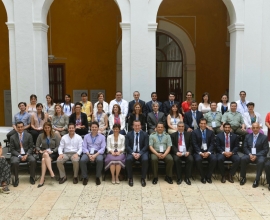Fourth Meeting of Ministers Responsible for Public Security: “Towards the adoption of a regional model for a comprehensive policy for the prevention of violence and crime”.
Ministers, deputy ministers and senior officials from Security, Governance, and Justice approved in Cartagena de Indias the “Cartagena Declaration on prevention of violence” within the framework of EUROsociAL
Ministers and deputy ministers of Security, Governance, and Justice from 15 Latin American countries and representatives of the European Union and international bodies met today at the Spanish Cooperation Training Centre in Cartagena de Indias (Colombia) to jointly address the problem of citizen security from the perspective of prevention. Within this framework, they signed the “Cartagena Declaration on prevention of violence ” after approving a series of documents that will contribute to improving the effectiveness of these policies, such as the Regional Model for a Comprehensive Policy for Prevention of Violence and Crime.
This model uses the experiences of Latin American and European countries as references, defines a theoretical framework, and makes a series of recommendations for improving coordination between the institutions involved in violence prevention at both the national and local level, to define programmes focused on groups like youth and minors, among other aspects. The process of defining it involved the participation of institutions from over 11 Latin American countries and international bodies such as the World Bank, the Organization of American States, and the United Nations Development Programme.
The Fourth Meeting of Ministers Responsible for Public Security, “Towards the adoption of a regional model for a comprehensive policy for the prevention of violence and crime” was organised by the EUROsociAL Programme, the European Union cooperation programme with Latin America for promoting social cohesion. The participants included ministers, deputy ministers and senior officials from Colombia, Costa Rica, Brazil, Bolivia, Chile, Ecuador, El Salvador, Guatemala, Honduras, Mexico, Panama, Peru, Uruguay, Nicaragua, and Argentina.
The purpose of the forum is to compare policies and seek joint solutions to a problem that has many similar aspects throughout the region so that they can share experiences and proposals for improvement. The operational partners for this event are the European Forum for Urban Security (EFUS) and the International Juvenile Justice Observatory (OIJJ), under the coordination of Expertise France.
The participants all agreed that the States of Latin America have made progress in the construction of policies for preventing violence and crime by moving, for example, from centralised or traditional approaches towards decentralised and participatory models, but that it is necessary to go deeper into processes for building institutional and citizen capacities to continue advancing.
The Director of Justice, Security and Governance of the National Planning Department, Diego Restrepo, highlighted the contribution of the Regional Model for Prevention of Violence and Crime to Colombia's National Security and Citizen Coexistence Policy, as they share a common vision. “We are before a public policy that requires the combined work of public officials, experts and social agents which will make it possible to understand the problem from interdisciplinary perspectives, with flexible and inclusive analytical frameworks. Based on these, it will be possible to avoid social and situational risks that lead to criminal scenarios and to strengthen the tools of justice and control, always according to the legal framework of our constitutional State”, he emphasised.
“In Colombia for the first time we have a public policy on security and citizen coexistence, now that we've understood that security is not solely the responsibility of the police, and a strategy was defined that prioritises crimes and cities. We have united local and national forces to combat crime and its principal causes with short-, medium- and long-term actions. For the first time a public policy on security and coexistence has been promoted from the Presidency. The balance, measured through various sources, is very positive, without forgetting the challenges that exist”, explained Aníbal Fernández de Soto, Director of Security of the Office of the Post-conflict Counsellor-Minister, Human Rights and Security.
For María Wilhelmina Josepha Antonia Van Gool, European Union Ambassador one very important aspect of the EU's foreign policy is working for transparent justice, equal rights, human rights, and for equitable and sustainable development. “Violence and crime are obstacles to achieving these objectives” she asserted.
The Head of the Programme Unit for Latin America and the Caribbean of EuropeAid, Jean-Paul Joulia, responsible for EUROsociAL, reaffirmed the European Union's commitment to Latin America in the area of citizen security “the support for this process of regional Latin American work which, beyond an exchange of experiences between countries, leads to a concrete agreement to install and develop a regional model for prevention of violence and crime with a comprehensive approach”. The model will represent a frame of reference for consolidating current efforts by the States to institutionalise, implement and evaluate prevention policies, and it will contribute to the social cohesion agenda put into place in recent years.
Participants in the opening ceremony included other authorities such as General Rodolfo Palomino, Director General of Colombia's National Police; Roberto Barrios, Secretary of the Interior of Cartagena de Indias; and Mercedes Florez, Director of the Spanish Cooperation Centre in Cartagena.
Expertise France / EFUS / OIJJ

